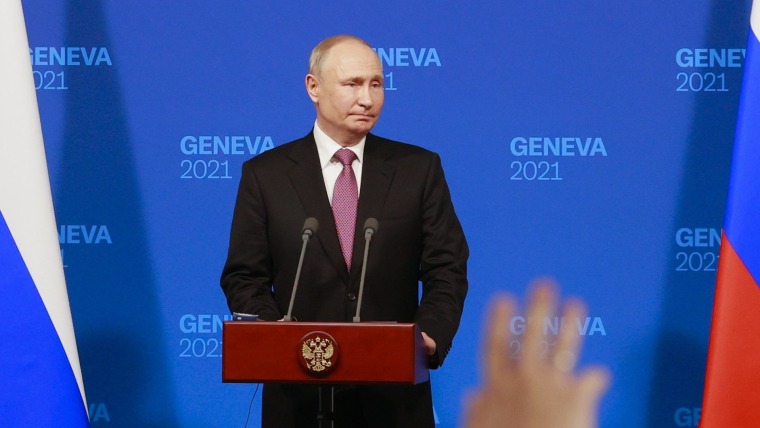As was expected, the hourslong summit between President Joe Biden and Russian President Vladimir Putin produced little in the way of major results. The only point of commonality before the meeting was an acknowledgment that U.S.-Russia relations were at their lowest point in decades. The fact that Biden and Putin even went ahead with their meeting could be considered an accomplishment.
The shiny gloss covering Russia-China relations today masks deeper, systemic disputes. Russia has turned to China not necessarily because it wants to, but because it needs to.
But for all their points of friction — Russian cyberattacks and intrusion into U.S. elections, differences over Ukraine, NATO expansion and human rights — Biden drilled home a key point at the start of their talks: The U.S. is still willing to cooperate with Russia when it’s in U.S. interests to do so. “I think it’s always better to meet face to face, try to determine where we have mutual interest, cooperate,” Biden said.
Seen from the constant churning of the news cycle, the notion of Washington and Moscow getting together to resolve problems seems improbable, if not fanciful. Zoom out, however, and Biden and Putin have more in common on the global stage than they might care to admit: namely, how to balance out China’s growing strength, which the Pentagon terms its principle geopolitical challenge.
Like the Trump administration, the Biden administration views China as a rising power determined to rewrite the global rules of the road. The White House’s Interim National Security Strategic Guidance places China at the head of the pack in terms of strategic challengers, calling Beijing “the only competitor potentially capable of combining its economic, diplomatic, military, and technological power to mount a sustained challenge to a stable and open international system.”
While Russia may not use those exact words, it isn’t immune to concerns about a waking the Sleeping Giant. In particular, Russia eyes with leeriness Beijing’s assertiveness in Russia’s near-abroad. The U.S. should use this to its advantage rather than seeking to fight a two-front battle against Russia and China simultaneously, which would stretch U.S. resources and further cement ties between Moscow and Beijing. Rather than ratcheting up tensions with Putin, the U.S. should do its part to dial down the animosity.
The U.S. and Russia collaborating to address a rising China might appear odd given the chumminess between Moscow and Beijing. Chinese President Xi Jinping and Putin increasingly view each other as close pals, even best friends. Moscow and Beijing are coordinating with greater frequency in the military realm, with Russian and Chinese naval and land forces conducting joint exercises in 2017, 2018 and 2019. The two countries are even boosting ties in space exploration.
Yet the shiny gloss covering Russia-China relations today masks deeper, systemic disputes. Russia has turned to China not necessarily because it wants to, but because it needs to. It’s no coincidence that Moscow began pivoting toward Beijing economically after being subjected to increasingly strong U.S. and European Union sanctions in retaliation for its annexation of Crimea. While durable ties with China helped the Kremlin keep its crude oil exports flowing, they also increased Russia’s dependency on the Chinese market. China is now Russia’s largest trading partner; Russia, meanwhile, doesn’t even make China’s top 10.
Russian reliance on its large and sometimes prickly neighbor comes even as China’s power, leverage and ambitions are slowly encroaching on Russia’s traditional sphere of influence. Central Asia, for instance, used to be commonly referred to as Russia’s domain — an area where the Kremlin had next to no strategic competition. Today, however, the region is a core part of China’s trillion-dollar Belt and Road Initiative, a series of infrastructure projects from Europe to East Asia aimed at enhancing Beijing’s economic and diplomatic reach that it’s financing through hundreds of billions of dollars in loans.
The Chinese Communist Party is also making separate investments in Central Asia. For instance, Kazakhstan, once part of the Soviet Union, has received $27.8 billion from China to beef up its petrochemical industry. Turkmenistan, another former Soviet client, accepted billions of dollars in Chinese loans to develop its gas industry. This Chinese lending means a landlocked Central Asian state is no longer at the mercy of Russia to export goods to the international market. For Putin, an expert in hard-nosed power politics and a nationalist at heart, this loss of leverage undermines his attempts to rehabilitate Russia’s image as a great power.
Like the United States, Russia also views some of China’s behavior as predatory. The Russian government recognizes the unintended consequences of accepting Chinese loans and has no intention of following in the footsteps of countries like Sri Lanka and Montenegro that either struggle with a mountain of debt or are forced to hand over control of strategic assets to Chinese entities as compensation. Just as China steals U.S. military technology, Russian defense manufacturers have complained about Beijing copying Russian military equipment without their consent.
Just because Washington and Moscow have similar diagnoses on some of China’s foreign policy behavior, of course, doesn’t mean the two powers will coordinate their respective policies. Those who think Biden can reverse-engineer Richard Nixon’s China detente by flying to Moscow and getting Russia on its side underestimate just how hobbled U.S.-Russia relations are now.
What the Biden administration can do, however, is refrain from policies that drive Russia and China closer together or make a workable, productive relationship between Washington and Moscow more difficult than it otherwise has to be. This will likely require the Biden administration to get far more realistic about what it can achieve with Russia and avoid dwelling on issues — in particular, how the Russian government acts within its own borders — that are likely to prove counterproductive and do little more than entrench deeper animus in the bilateral relationship.
Fortunately, Biden and Putin may both understand the urgency of doing exactly that. The joint statement issued immediately after their meeting, in which both pledge to “embark together on an integrated bilateral Strategic Stability Dialogue in the near future,” is reflective of pragmatism slowly injecting itself into the relationship. Putin’s statement that the U.S. and Russia agreed to once again exchange ambassadors was another small but essential step in the right direction.
The U.S. desperately needs a more comprehensive and long-term approach toward Russia, one that not only resolves some of the disagreements of recent months but also provides Putin with an incentive to at least stay somewhat neutral in a world now defined, for good or ill, as a great power contest between the U.S. and China.
Vladimir Putin will never be a U.S. ally. But he likely doesn’t want to be China’s ally either, which would subjugate Russia to the status of a junior partner. However, if U.S.-Russia relations remain as tense and counterproductive as they currently are, the U.S. may eventually wake up facing the thing it should most be trying to prevent: a formidable joint Chinese-Russian anti-U.S. block.
Source: | This article originally belongs to Nbcnews.com











